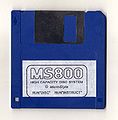Difference between revisions of "MS800"
Cpcmaniaco (Talk | contribs) |
Jonathanen (Talk | contribs) |
||
| (7 intermediate revisions by 4 users not shown) | |||
| Line 1: | Line 1: | ||
MS800 was among the simplest of the high-capacity 3.5in disc operating systems. | MS800 was among the simplest of the high-capacity 3.5in disc operating systems. | ||
| − | The "MS" stood for [[Microstyle]], the company (run by [[Phil Craven]]) that sold it | + | The "MS" stood for [[Microstyle]], the company (run by [[Phil Craven]]) that sold it. |
| − | + | The program provided a small number of RSXs which selected formats for each drive, simply by copying values into the [[XDPB]]. | |
| − | + | As with [[S-DOS]] and [[400K/S]], this meant that double-sided formats were not supported, so the user needed a [[Side Select Switch|side switch]] to use each disc to its full capacity. | |
| − | MS800 was bundled with drives sold by Microstyle and was also available separately. | + | One unusual design feature, which had both advantages and disadvantages, was the presence of a "boot loader"-type program on certain formats. |
| + | |||
| + | This was a short BASIC program which was saved on each MS800 disc. | ||
| + | |||
| + | Running this program would set up the format for the disc, even if you didn't own MS800. | ||
| + | |||
| + | However, the downside of this approach is that this meant the sector numbers had to be limited to the standard set used by the 'Data' [[disc format]] (&C1-&C9). | ||
| + | |||
| + | Consequently even those programs capable of automatic format detection (such as [[S-DOS]] 2 and [[ParaDOS]]) could not auto-detect the MS800 format. | ||
| + | |||
| + | MS800 was bundled with drives sold by [[Microstyle]] and was also available separately. | ||
| + | |||
| + | == Pictures == | ||
| + | |||
| + | <gallery caption="MS800 Screenshots"> | ||
| + | Image:MS800.gif|MS800 v1.11 | ||
| + | </gallery> | ||
== Disc == | == Disc == | ||
| Line 14: | Line 30: | ||
Image:MS800 Disc.jpg|The Program | Image:MS800 Disc.jpg|The Program | ||
| + | Image:MS800 - Disc.jpg|Another version | ||
</gallery> | </gallery> | ||
| + | == Download == | ||
| + | |||
| + | * [[Media:MS800.zip|MS800.zip]] (DSK for Emulators) | ||
| + | |||
| + | * [[Media:MS800_v1.11.ZIP|MS800 v1.11 (Rom)]] (ROM for Emulators) | ||
| − | [[Category:Operating System]] [[Category:Expansion ROM]] | + | [[Category:Disc Operating System]] [[Category:Expansion ROM]] |
Latest revision as of 20:19, 19 October 2014
MS800 was among the simplest of the high-capacity 3.5in disc operating systems.
The "MS" stood for Microstyle, the company (run by Phil Craven) that sold it.
The program provided a small number of RSXs which selected formats for each drive, simply by copying values into the XDPB.
As with S-DOS and 400K/S, this meant that double-sided formats were not supported, so the user needed a side switch to use each disc to its full capacity.
One unusual design feature, which had both advantages and disadvantages, was the presence of a "boot loader"-type program on certain formats.
This was a short BASIC program which was saved on each MS800 disc.
Running this program would set up the format for the disc, even if you didn't own MS800.
However, the downside of this approach is that this meant the sector numbers had to be limited to the standard set used by the 'Data' disc format (&C1-&C9).
Consequently even those programs capable of automatic format detection (such as S-DOS 2 and ParaDOS) could not auto-detect the MS800 format.
MS800 was bundled with drives sold by Microstyle and was also available separately.
Pictures
- MS800 Screenshots
Disc
- MS800
Download
- MS800.zip (DSK for Emulators)
- MS800 v1.11 (Rom) (ROM for Emulators)


